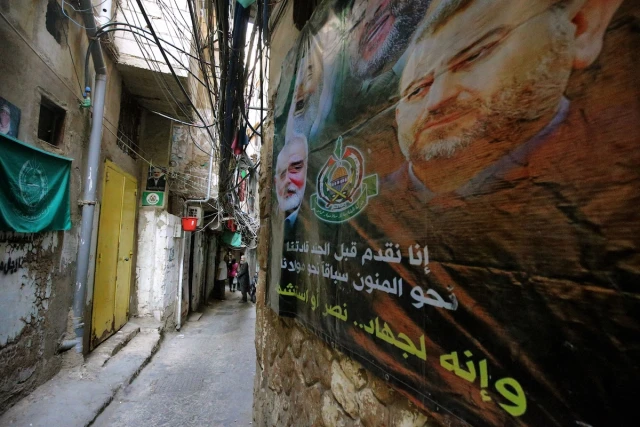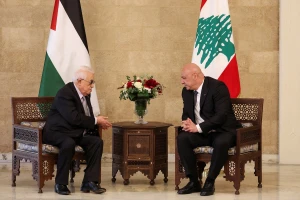Lebanon moves to disarm Palestinian refugee camps that serve as 'hotbeds of radical Islam'

The Lebanese government hosted Palestinian Authority (PA) President Mahmoud Abbas on Wednesday amid efforts by Beirut to disarm Palestinian terrorist factions located in camps that were established for Arab refugees after the Arab Israeli War in 1948.
For the past 77 years, Lebanon has denied the Lebanon-born descendants of the original refugees to integrate into society. The camps, which have evolved into de facto semi-independent cities, have consequently become hotspots for poverty, crime, terrorism and extremism.
“Residents are waiting for someone to see them as human beings, not as a group living in an isolated area called a ‘camp,’ and not as a political or security issue,” a local resident, Walid, told the Al-Akhbar news outlet.
Lebanon officially hosts 12 camps and is expected to begin the disarmament of the camps in June, “by force if necessary.” The number of Palestinian Arab residents in Lebanon is disputed. A report by the news outlet Al-Akhbar assessed that there are 520,000 registered residents, while other sources believe that the true number is around 280,000. Some 230,000 individuals are reportedly currently enrolled in the UNRWA’s emergency program in Lebanon.
Eyal Zisser, a Tel Aviv University professor who specializes in Lebanon and Syria, explained that Lebanon’s socio-economic decline began with the militarization of the camps in the 1970s.
“Historically, Lebanon’s problems began in the refugee camps,” Zisser assessed. He explained the importance of disarming the camps, which are also linked to the powerful Iranian-backed terrorist militia Hezbollah.
"Palestinians formed an armed militia in the 1970s, which started the downward spiral. Moreover, Palestinians initially supported the Shiites and Hezbollah. Imad Mughniyeh, a top Hezbollah figure killed in 2008, was originally with the PLO. So you can’t deal with one issue without addressing the other. The camps are also hotbeds of radical Islam. For Lebanon, they are no less important than Hezbollah – and far easier to address first,” he stated.
Hezbollah caused massive damage in Lebanon following its attack on Israel on Oct. 8, 2023. Israel responded by delivering severe blows to Hezbollah, which reluctantly agreed to a ceasefire in November 2024.
Zisser noted that Hezbollah has largely refrained from initiating hostilities against Israel during the ongoing ceasefire. In contrast, “It’s the Palestinians who occasionally open fire and stir trouble,” Zisser said.
In March 2025, six rockets were fired from Lebanon against the northern Israeli town of Metula. Israel responded by striking Hezbollah targets inside Lebanon. However, the Iranian-backed terror group denied it was behind the rocket fire against Israel. Lebanese authorities, who increasingly seek to prevent militants from using Lebanese territory for attacks against Israel, reportedly believed that radicalized Palestinian Arab terrorist groups like Hamas in Lebanon could have been behind the rocket attack on the Jewish state.
Zisser compared the disciplined behavior of Hezbollah to the radicalized camp-based groups.
“If you strike a deal with Hezbollah Secretary-General Naim Qassem, it holds. But Hamas just suddenly fires rockets,” he said.
Majed Faraj, the PA's General Intelligence chief who visited Lebanon ahead of Abbas’ visit, reportedly offered to cooperate with the Lebanese authorities in the complex effort to disarm the camps. There is reportedly growing international pressure on Lebanon to expel Hamas terrorists from its territory.
Unlike the PA, Hamas still enjoys wide support within the radicalized camps. Consequently, the PA administration in Ramallah likely assessed that disarming the camps would weaken its rival Hamas. While the PA supports the Lebanese authorities, it lacks the power to enforce disarmament measures in Lebanon.
At the same time, both Lebanon and the PA have affirmed their commitment to a “just solution” for the Arab refugees – one that would allow them to return to the homes from which they were uprooted in their homeland (Israel) – explicitly rejecting any “resettlement” or “displacement” alternatives. Despite efforts to disarm the camps, Lebanon and the PA both seek to maintain the local residents as perpetual “refugees” in Lebanon, even though the vast majority were born in the country and have never lived outside Lebanon.

The All Israel News Staff is a team of journalists in Israel.
You might also like to read this:










